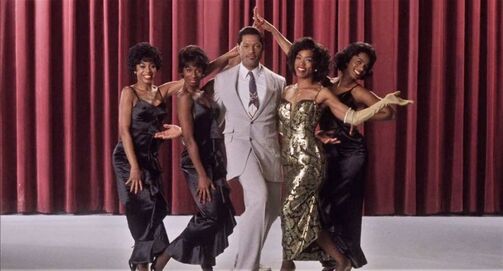|
Still smarting from 2023’s major disappointment, Ridley Scott’s Napoleon, Maestro suffers from the same fatal flaw that doomed Scott’s latest historical epic. A movie about a famous male figure doesn’t want to submit to the out-of-fashion great man of history framing, so he shares the cinematic spotlight with his wife. While this gives actresses equal opportunity for prestige filmmaking, it’s the rare biopic or docudrama that makes a marriage as interesting as whatever the central figure accomplished, accomplishments which are the reason the movie is being made in the first place. I knew a lot about Napoleon going into that movie, but all I really knew about Leonard Bernstein is that he inspired Lydia Tar to take up conducting. Bradley Cooper’s thirsty Oscar play leaves this viewer without much to add to that biography, except that he was sweaty, semi-closeted, and sparred with his wife who was also in the public eye. Seems like music would be an important part of the whole picture.
0 Comments
 Enacted in WWI nationalistic fervor, the Espionage Act is a blunt tool that the government can break out whenever it wants to bring the hammer down on leakers, including those who expose crimes by the US government at home and abroad. In the War on Terror era, Chelsea Manning and Edward Snowden are only the most well-known conscientious leakers. Amongst many others, Daniel Hale, descendant of Revolutionary icon Nathan Hale, released documents about the drone program, John Kiriakou disclosed information about torture, and Terry Albury exposed the surveillance and infiltration of American Muslim communities. These men weren’t trying to sell out the government to foreign adversaries, but inform the American public of crimes done in their names and felt there was no alternative way to do so that precluded them serving jail time. Reality Winner is an interesting addition to this clan of whistleblowers, as what she gave to the press was malfeasance from a foreign government towards the same government that tapped Angela Merkel’s personal phone. It’s harder to feel righteously indignant about her actions, understandable as they might be. Who wouldn’t find it difficult to be in a position to shut up Sean Hannity and do nothing? Tina Satter’s Reality, adapted from a play that is itself adapted from the FBI transcript of Winner’s initial interrogation, doesn’t portray Winner in the way Oliver Stone portrayed Snowden. She’s not wracked by guilt over what her bosses are doing, but is a little too trusting and a little naïve and tired of hearing bloviating conservative voices. Reality is a character study and a smaller film befitting Winner’s more impulsive actions, but the insignificance of her actions doesn’t stop her from looking like a nail to the government’s hammer. With his 34th film, Steven Spielberg isn’t going for spectacle or the weight of grand historical events. In the Fabelmans, Spielberg is changing all the broken family subtext in so many of his movies into text, finally making an autobiographical film about his childhood unencumbered by aliens, friendly or otherwise. As he approaches his ninth decade, Spielberg is still able to connect to the wonder of a child, only this time, the child is him. A combination of finding the passion that will sustain a life and uncovering adult messiness, the Fabelmans is likely to be Spielberg’s only crack at his upbringing though there’s enough material there for another attempt. While this go is imperfect in its broad scope, one of the great American artists and perhaps the greatest pop artist is incapable of making anything less than a thoughtful and propulsive film, as long as we agree that Ready Player One never happened.
 The 21st century Golden Age of Television spent its first decade saying a lot about modern masculinity, from Tony Soprano to Walter White. These great TV protagonist, and others like them, were many things, but near the top of the list, they were deconstructions of the myth of the American male, the strong and silent type that Tony often extolled. No matter what misdeeds these guys committed, they repeatedly fell back on the 'doing it for my family' excuse. In Ruben Ostlund's excellent film Force Majeure, this theme is transported to a French ski resort, as a family's innate expectations about protection and self-sacrifice are thrown into question.
 In the time before Walk Hard, when everyone wasn’t wise to the tropes and rhythms of the musician biopic and they came out at a slower clip than they do today, What’s Love Got To Do With It experienced critical and commercial acclaim by turning one of the most energetic singers and performers into a terrified victim of spousal abuse. Tina Turner’s career can be divided into the half that she spent with her cruel husband Ike, a brief interregnum where she struggled to feed her children after divorcing Ike in a one-sided settlement, and the half that she toured the globe, selling out arenas and starring in movies opposite Mel Gibson. Brian Gibson’s film focuses entirely on the first half, a choice that doesn’t bury the film but does make the viewer consider alternatives. A good biopic is the kind that doesn’t take its subject from cradle to grave, and What’s Love Got To Do It finds a tidy arc in the portion of Turner’s life it covers. |
AuthorsJUST SOME IDIOTS GIVING SURPRISINGLY AVERAGE MOVIE REVIEWS. Categories
All
Archives
April 2023
Click to set custom HTML
|


 RSS Feed
RSS Feed